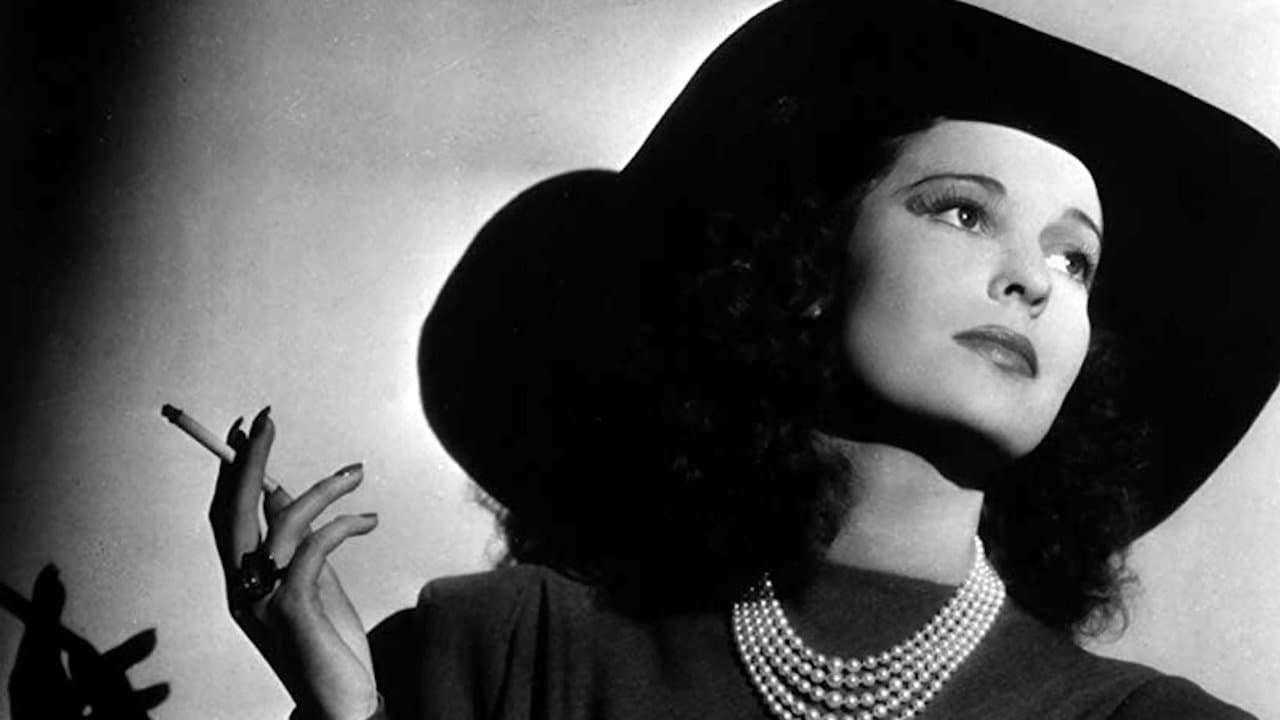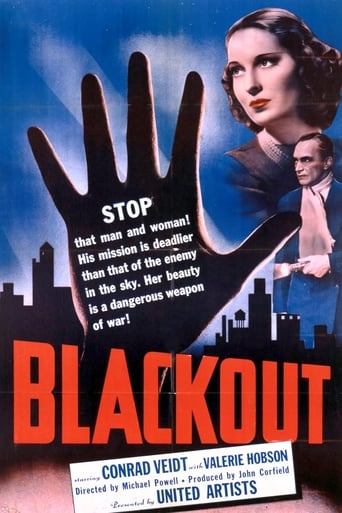robert-temple-1
This film, released both as CONTRABAND and as BLACKOUT, is a highly superior suspense and espionage film of the immediate pre-War period. The stars are Conrad Veidt and Valerie Hobson, and the chemistry between them is almost as good as that between Bogart and Bacall in CASABLANCA (1942, in which, by the way, Veidt also appeared). Little can anyone have realized when this film was made, but Veidt had very little time left to live. He dropped dead while playing golf in 1943 at the age of only 50. Veidt and his third wife, who was Jewish, fled Germany to escape the Nazis in 1933, and settled in England. Germany's loss was England and America's gain, for Veidt, as a famous German star, had an effortless magnetism and enormous talent on screen. He lent gravitas to many a shaky part. Here he plays a Danish ship's captain, thus excusing his accent, which was of course really a German one. But the English public had little familiarity with the Danes since the Danish Vikings departed several hundred years earlier, so they did not notice the difference. (Lots of very blond people in the north-east of England are what the Danish Vikings left behind.) In the film there is a large Danish restaurant called Viking in the middle of London, where people dress in white tie for dinner and eat lots of herrings and have exotic haute cuisine and excellent wines. I wonder if any such Scandinavian gastronomic outpost ever really existed in London at any time. For a passionate herring-lover like myself, if only! (The best way to cook a herring is Scottish-style. And I bet you don't get many recipes in IMDb reviews, but here goes. Dip it in milk, roll it in organic oatmeal, gently pan-fry it in a modicum of pheasant fat, or if you can't find any then use goose fat. Allow to become brown and crisp. After eating, skin and oats and all, have tranquillizers ready to help you recover from the ecstatic culinary experience. And that is enough food for today.) This film was made before Denmark was invaded by the Nazis, so there is a great deal of Danish patriotism on display, including all the waiters and the proprietor of the Viking joining up to help Veidt and singing a patriotic Danish song. Valerie Hobson plays Mrs. Soerensen, a British divorcée whose ex-husband is Danish. In reality, she is an intrepid British spy. Veidt's Danish ship on its way back to Denmark is diverted into harbour in Britain for contraband inspection, and Valerie Hobson and a spy accomplice steal Veidt's landing permits in order to make a dash for London on their secret business. Veidt is annoyed and chases after them, but has no British money with him, which means he cannot even pay for a taxi when he arrives in London. He and Hobson end up becoming entangled first in complex spy activities, being captured and tied up by Nazi spies in London, and then become romantically entangled as well because they are irresistibly attracted to one another. So the ingredient of romance, tinged with irony, runs through the action. Valerie Hobson really shines in this film. She was amazingly beautiful at that time and what is called 'an absolute charmer'. And she has the most intense bedroom eyes, to which Veidt is far from indifferent. This film featured a number of interesting early appearances and non-appearances. Deborah Kerr got her first job in a film playing a cigarette girl, but her scenes ended up on the cutting room floor, which must have added to the attractiveness of the floor, if not to the elevation of the young actress's expectations. Leo Genn and Peter Bull, such sturdy stalwarts of the British film business over decades, appear in supporting roles. Countless of us knew Peter Bull from his astrology shop in Notting Hill Gate, where until his death in 1984, it was always amusing to go in and browse and engage him in conversation about all the old movies he had been in and hear his bombastic and witty exposes of the foibles of his colleagues and racy tales of calamities on the set and on location. He was never a shy person and relished being drolly gay. Bernard Miles fixes a pipe in this film and Milo O'Shea is an air raid warden, his first film appearance, and more fortunate than Deborah Kerr in that he was not cut out. The blackout scenes in London are very informative and interesting, being entirely accurate. One learns, for instance, that the traffic lights at night shone only through small crosses cut in the centres of the shades in front of the lights (this can be seen in a scene where Veidt and Hobson are crossing a street). The film is thus remarkably informative about the conditions of early wartime London, and thus has a considerable historical importance. For those who like shots of old naval ships, there are plenty of those to see steaming around. The snappy editing of this film is by John Seabourne, Senior, skills which were later to be used to heighten the eerie dramatic power of THE ROCKING HORSE WINNER (1949) in particular. He is certainly an under-appreciated talent of the period, who left the industry in 1959 (born in 1890, no date of death is recorded for him on IMDb) after editing 39 films, several of them classics such as I KNOW WHERE I'M GOING (1945) and A CANTERBURY TALE (1944). This film was directed by the talented Michael Powell and the original story and screenplay are by his Romanian/Hungarian/Jewish collaborator Emeric Pressburger. They would go on to make together 49th PARALLEL (1941, see my review), several films with the editor John Seabourne, and would become world famous with THE RED SHOES (1948), along with countless other films which are fundamental to British cinema history.
writers_reign
Never underestimate the power of hype and the willingness of impressionable snobs to praise the mediocre. If people were easily pleased in 1940 it seems little has changed in almost 60 years. I accept that Powell and Pressburger completists will want to see and/or own this film but just because the team turned out a couple of half decent movies doesn't mean that every early effort was gold dust. The year before the same team had enjoyed a minor success - not, surely, that hard in wartime - with the Spy In Black and figured why not team Conrad Veidt and Valerie Hobson again and this time, improbable and unrealistic as it is, have them fall in love in between escaping from a spy ring. All sorts of people pop up here and it's amazing that the likes of Peter Bull, Leon Genn and Bernard Miles went on to appear in anything else let alone enjoy reasonable careers. For completists only.
christopherjanethardiman
Conrad Veidt and Valerie Hobson had appeared together with surprising effect in 'The Spy in Black'. They were reunited in this splendid comedy thriller with a Hitchcockian mode the following year.Lots of action and wry humour, with a pleasing spy story set in a London blackout. Hobson plays a spy who needs to get information to the Admiralty. To do this, she steals the landing pass of the ship's skipper (Veidt) whilst the ship is in harbour for a contraband check.Veidt follows her to London where they encounter a Nazi spy ring intent on obtaining this information. They are tied up, but Veidt escapes, and with the help of fellow Danes (Veidt is Danish in this film, and a good guy!), foils the plot.Funny, charming, sexy and thrilling (with just a little bit of bondage!), and with a great chemistry between the two stars.Great fun!
fordraff
The advertisement about this film from Kino Video led me to think I was going to see an exciting spy story with noirish overtones and a Hitchcockian twist.It is nothing of the sort.If Hitchcock had made this film, smooth, suave Cary Grant would have had the lead, and he would have been opposite a cool, sophisticated blonde. Before the film had ended, Grant would have melted her coolness for a final kiss or, as in "North By Northwest," an implication of sexual surrender.Here we are asked to accept Conrad Veidt, at age 47 and looking every year of it just three years before his death, in the Cary Grant role and Valerie Hobson, twenty-four years his junior, in the cool blonde part. There is just about no one further removed from Cary Grant than Conrad Veidt. However, it was interesting to see him playing someone other than a villain, but at the same time, I realized that such roles were his forte.Of course, Valerie Hobson isn't blond. And here she looked like Merle Oberon and acted as stiffly. There were absolutely no sparks between Hobson and Veidt, to say nothing of the dialogue which was totally unwitty and without any double entendres. I suspect that Kino's publicity about the Hitchcockian touch had in mind Hitchcock's "The 39 Steps," where Robert Donat and Madeleine Carroll must put up with each other against their wills.I cared nothing for the characters. The film had no narrative thrust (what happens next?). It was a total waste of my time.

